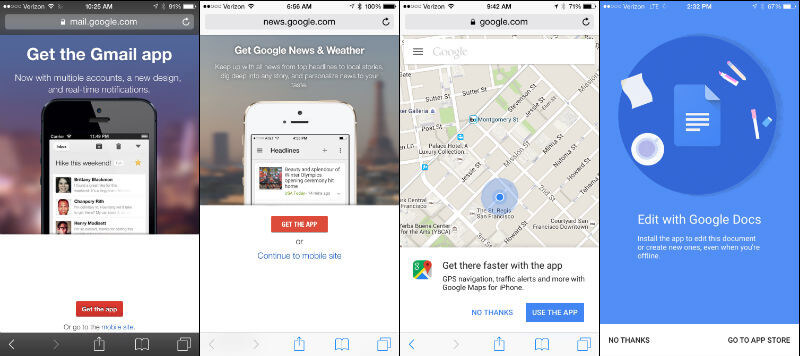Google Goes After The App Interstitial: Protecting Consumers Or Its Own Search Monopoly?
Google recently published a case study suggesting that app download interstitials on mobile are ineffective, leading to high page abandonment rates. But Jeremy Stoppelman of Yelp believes that there might be something more at play.
In 2010, Steve Jobs made a prescient observation: When it comes to accessing information on smartphones, people strongly prefer apps over mobile browsers.
A point Jobs left unsaid — perhaps because it is so obvious — was that in order for consumers to enjoy the advantageous experience apps provide them, they need to know the app exists. In other words, those apps must be somehow discoverable.
While many users find apps by browsing inside an app store, another critical way they discover new apps is through mobile search engines, like Google. In this way, mobile search indeed serves a critical function to users: offering a bridge from the less desirable world of mobile Web browsing to a new world inside apps.
Apps Threaten Google’s Search Business
After users cross the bridge from mobile Web to apps, they likely don’t go back. This presents an existential threat to Google’s core business of search, which envisions Google as the “middleman” for all information transactions on the Internet. Apps disintermediate — or, in plain English, remove the middleman — and allow the consumer to interact directly with the developer.
The early observations of Jobs on users’ app behavior are proving to be true. Last year, comScore reported that mobile apps accounted for the majority of digital media consumption activity on mobile devices — smartphone users spent 88 percent of their time in apps, and tablet users spent 82 percent of their time in apps.
Apps typically provide a better experience than the slow and herky-jerky experience found on the mobile Web, yet there is real friction involved in getting users to download an app.
The rewards for getting a new app user are huge, as these users end up being much more engaged. Many large Web properties have come to realize the power of this new method of audience building and have started pushing their apps quite prominently through interstitial app pitches.
Some interstitials perform poorly and can be hugely annoying to consumers, but they don’t have to be. Developers can strike a balance between providing useful content in an interstitial and promoting their app.

Yelp’s interstitial
The Google Case Study
In Google Webmaster Blog’s recent “case study,” a Google engineer discusses his (unsuccessful) attempt to promote the Google+ app and concludes by strongly cautioning other webmasters not to use interstitial app promotions. In the Google+ example, 69 percent of users “abandoned” when they saw the app pitch.
The case study doesn’t provide enough detail to get a true understanding of what was really going on, and the design of the experiment is easily critiqued.
For example, a thoughtful engineer might ask what percentage of users abandon/bounce when they simply land on the target Google+ mobile Web page? A bounce rate of 69 percent isn’t particularly rare — in which case, maybe it’s not the app pitch that is the problem.
Comparing our own experiences at Yelp, we don’t see users abandoning our app pitches anywhere near this rate. In fact, it’s been quite an effective way to drive new app users.
This method of driving app downloads via a full-screen pitch is so effective that Google itself has leveraged it for many of its own apps (that is, when they weren’t already pre-loaded on smartphones by default).
Of course, it’s not just Google that relies on interstitials, but also much of the app ecosystem, including popular names like Pinterest, Hipmunk, TripAdvisor, Yahoo, Redfin, Hotwire and Wish, just to name a few.
So if Google uses these app pitches, and many industry leading companies successfully do, too, then why would Google want to discourage their use — or perhaps even outlaw them (via an explicit ranking penalty in search)?
(EDITOR’S NOTE: After this column was published, Google announced that app interstitial ads that cover a “significant amount of content” on a page would, after November 1, be considered NOT mobile-friendly and will not rank as well as mobile-friendly Web pages.)
A Conflict Of Interest
From our vantage point, it’s clear: A user who downloads an app is a user who’s less likely to perform a Google search in the future. For example, if you do a local search on Google and then download the Yelp app, you’re less likely to do another search for a local business on Google. If you search for a new home on Google and end up downloading the Redfin app, you’re probably sticking with Redfin going forward, and so on.
When it comes to apps, Google’s Web search team has a conflict of interest. The more a user downloads apps, the less likely that user is to search the Web with Google — and that jeopardizes their extremely profitable search monopoly.
App developers who attract downloads via the mobile Web should see this poorly designed Google+ study for what it really is: Google foreshadowing a search ranking penalty designed to slow users’ natural migration away from Web search towards apps, a major consumer trend that Steve Jobs accurately predicted.
Opinions expressed in this article are those of the guest author and not necessarily Search Engine Land. Staff authors are listed here.
Related stories
